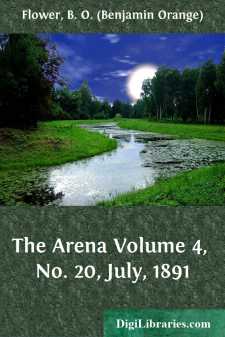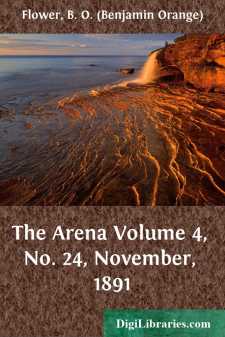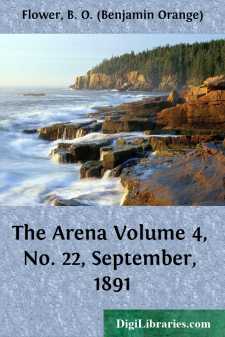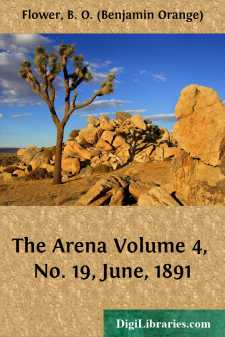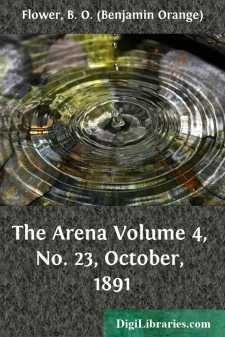Categories
- Antiques & Collectibles 13
- Architecture 36
- Art 48
- Bibles 22
- Biography & Autobiography 813
- Body, Mind & Spirit 142
- Business & Economics 28
- Children's Books 17
- Children's Fiction 14
- Computers 4
- Cooking 94
- Crafts & Hobbies 4
- Drama 346
- Education 46
- Family & Relationships 57
- Fiction 11829
- Games 19
- Gardening 17
- Health & Fitness 34
- History 1377
- House & Home 1
- Humor 147
- Juvenile Fiction 1873
- Juvenile Nonfiction 202
- Language Arts & Disciplines 88
- Law 16
- Literary Collections 686
- Literary Criticism 179
- Mathematics 13
- Medical 41
- Music 40
- Nature 179
- Non-Classifiable 1768
- Performing Arts 7
- Periodicals 1453
- Philosophy 64
- Photography 2
- Poetry 896
- Political Science 203
- Psychology 42
- Reference 154
- Religion 513
- Science 126
- Self-Help 84
- Social Science 81
- Sports & Recreation 34
- Study Aids 3
- Technology & Engineering 59
- Transportation 23
- Travel 463
- True Crime 29
The Arena Volume 4, No. 20, July, 1891
Categories:
Description:
Excerpt
OLIVER WENDELL HOLMES.
BY GEORGE STEWART, D. C. L., LL. D.
To the year 1809, the world is very much indebted for a band of notable recruits to the ranks of literature and science, statesmanship and military renown. One need mention only a few names to establish that fact, and grand names they are, for the list includes Darwin, Gladstone, Erastus Wilson, John Hill Burton, Manteuffel, Count Beust, Lord Houghton, Alfred Tennyson, and Oliver Wendell Holmes. Each of these has played an important part in the world’s history, and impressed the age with a genius that marks an epoch in the great department of human activity and progress. The year was pretty well advanced, and the month of August had reached its 29th day, when the wife of Dr. Abiel Holmes presented the author of “The American Annals” with a son who was destined to take his place in the front line of poets, thinkers, and essayists. The babe was born at Cambridge, Massachusetts, in the centre of a Puritan civilization, which could scarcely have been in touch and harmony with the emphasized Unitarianism emanating from Harvard. But Abiel Holmes was a genial, generous-hearted man, and despite the severity of his religious belief, contrived to live on terms of a most agreeable character with his neighbors. A Yale man himself, and the firm friend of his old professor, the president of that institution, who had given him his daughter Mary to wed (she died five years after her marriage), we may readily believe that for a time, Harvard University, then strongly under the sway of the Unitarians, had little fascination for him. But his kindly nature conquered the repugnance he may have felt, and he soon got on well with all classes of the little community which surrounded him. By his first wife he had no children. But five, three daughters and two sons, blessed his union with Sarah Wendell, the accomplished daughter of the Hon. John Wendell, of Boston. We may pass briefly over the early years of Oliver Wendell Holmes. He was educated at the Phillips Academy at Exeter, and subsequently entered Harvard University, where he was graduated, with high honors, in 1829, and belonged to that class of young fellows who, in after life, greatly distinguished themselves. Some of his noblest poems were written in memory of that class, such as “Bill and Joe,” “A Song of Twenty-nine,” “The Old Man Dreams,” “Our Sweet Singer,” and “Our Banker,” all of them breathing love and respect for the boys with whom the poet studied and matriculated. Young Holmes was destined for the law, but Chitty and Blackstone apparently had little charm for him, for after a year’s trial, he abandoned the field and took up medicine. His mind could not have been much impressed with statutes, for all the time that he was supposed to be conning over abstruse points in jurisprudence, he was sending to the printers some of the cleverest and most waggish contributions which have fallen from his pen. The Collegian,—the university journal of those days,—published most of these, and though no name was attached to the screeds, it was fairly well known that Holmes was the author. The companion writers in the Collegian were Simmons, who wrote over the signature of “Lockfast”; John O. Sargent, poet and essayist, whose nom de plume was “Charles Sherry”; Robert Habersham, the “Mr. Airy” of the group; and that clever young trifler, Theodore Snow, who delighted the readers of the periodical with the works of “Geoffrey La Touche.” Of these, of course, Holmes was the life and soul, and though sixty years have passed away since he enriched the columns of the Collegian with the fruits of his muse, more than half of the pieces survive, and are deemed good enough to hold a place beside his maturer productions. “Evening of a Sailor,” “The Meeting of the Dryads,” and “The Spectre Pig,”—the latter in the vein of Tom Hood at his best,—will be remembered as among those in the collection which may be read to-day with the zest, appreciation, and delight which they inspired more than half a century ago. Holmes’ connection with the Collegian had a most inspiriting effect on his fellow contributors, who found their wits sharpened by contact with a mind that was forever buoyant and overflowing with humor and good nature. In friendly rivalry, those kindred intellects vied with one another, and no more brilliant college paper was ever published than the Collegian, and this is more remarkable still, when we come to consider the fact, that at that time, literature in America was practically in its infancy....


